Aging Cigars: The Art of Time and Patience
Some things simply improve with age—whiskey, wine, cheese, people… even your favorite pair of jeans. With time, they become more refined, more comfortable, more you. Cigars are no different.
With a touch of patience, care, and the right conditions, cigars can develop deeper, more complex flavors that transform a good smoke into an exceptional experience. But aging cigars at home isn’t an exact science—it’s an art. And like any art, it involves a bit of experimentation. Fortunately, there are proven techniques to guide you toward better results. Let’s explore how aging cigars can elevate your collection—and your smoking experience.
What Is Cigar Aging?
Cigar aging technically begins long before the cigars reach your humidor. From the moment tobacco leaves are harvested, they begin a journey of fermentation, drying, and aging that shapes their final flavor. Many manufacturers even age cigars after rolling to ensure peak flavor upon release. However, once those cigars are in your hands, the aging process becomes personal. Home aging involves storing cigars for extended periods to allow the flavors of the filler, binder, and wrapper to harmonize. The result is a smoother, more balanced cigar with refined character and complexity. Proper storage is key. Even the best blends can suffer if not aged under the right conditions.
Do You Need to Age Cigars?
Technically, no. Cigars sold at reputable retailers are already aged to be smoked right away. Manufacturers take care to ensure each stick is ready the moment it hits the shelf. But for the cigar enthusiast, aging cigars at home adds another layer of anticipation—and discovery. Will a few months (or years) deepen the flavor? Will the aroma evolve? Aging lets you take a familiar cigar and turn it into something entirely new.
If your collection is growing faster than your ability to enjoy it, aging becomes both practical and rewarding. Cigars are natural products, and with time, they can change—often for the better. Try smoking a few from the same box over a span of months or years. You might be surprised how much they evolve.
Which Cigars Are Best for Aging?
Not all cigars age equally. A few things make a cigar a good candidate for long-term storage:
High-quality tobacco – Premium leaves will age more gracefully than lower-grade alternatives.
Larger ring gauges – These tend to age better due to their greater tobacco content, which allows for more flavor development over time.
Thicker cigars often mature into complex, nuanced smokes that deliver a more memorable experience from the first draw.
What Happens as Cigars Age?
As cigars sit in proper conditions, their chemical composition changes. The aging process softens strong or harsh flavors, balances the oils between the wrapper, binder, and filler, creates a smoother, more cohesive smoke, and improves burn consistency. With time, even bold cigars become gentler, more refined—and often more enjoyable.
How to Tell if a Cigar Is Aged
You’ll only recognize an aged cigar through experience. Pick a brand you like. Buy a box. Smoke one now, then another every few months. Compare how the taste evolves over time. Notice changes in aroma, smoothness, and complexity.
An aged cigar, when properly stored, often smells richer and burns more evenly. Its flavor notes will blend more seamlessly, with less bite and more depth.
Tips for Aging Cigars at Home
If you’re ready to explore cigar aging, follow these essential tips:
Invest in a Quality Humidor
A reliable humidor with a strong seal and cedar lining is essential. Cedar helps prevent mold and enhances flavor over time. Choose a size that allows for air circulation—about 20% empty space is ideal. Some enthusiasts use a dedicated aging humidor separate from their day-to-day stash.
Maintain the Humidor Properly
Rotate your cigars occasionally to ensure even exposure to humidity. Avoid opening the humidor too frequently, which can destabilize humidity levels. Once a month is a good rule of thumb. Every few months, clean the interior with isopropyl alcohol on a paper towel, then re-season it with distilled water.
Age in the Original Boxes
Storing cigars in their original boxes helps preserve oils and keeps humidity stable. If you’ve bought singles wrapped in cellophane or stored in tubos, leave them as-is. Avoid mixing cigars from different regions or with varying flavor profiles, as they may absorb each other’s aromas.
Ideal Conditions for Aging
The ideal environment for aging cigars is slightly cooler and drier than standard storage:
Relative Humidity (RH): 63–65%
Temperature: 63–65°F (17–18°C)
These conditions slow the aging process and allow for a more gradual, consistent evolution.
How Long Should You Age Cigars?
Cigar aging is a lesson in patience. Most cigars reach their peak between 1 and 3 years, though premium blends can continue improving for much longer. That said, cigars can be over-aged. After too many years, they may lose their strength, flavor, and structure. As with wine, the right moment to enjoy them depends on the blend, your preferences, and how they’ve been stored.
Final Thoughts
Not every cigar benefits from aging—but many do. With the right conditions and a little curiosity, you can unlock a richer, more satisfying smoking experience. So go ahead. Set aside a few sticks, forget about them for a while, and let time do its work. You might just discover that patience isn’t just a virtue—it’s a flavor enhancer.

